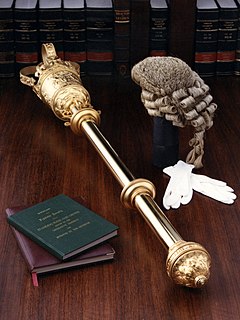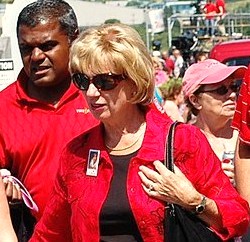Related Research Articles

The House of Commons is the lower house and de facto primary chamber of the Parliament of the United Kingdom. Like the upper house, the House of Lords, it meets in the Palace of Westminster.

The Palace of Westminster serves as the meeting place for both the House of Commons and the House of Lords, the two houses of the Parliament of the United Kingdom. Informally known as the Houses of Parliament after its occupants, the Palace lies on the north bank of the River Thames in the City of Westminster, in central London, England.

The House of Representatives is the lower house of the bicameral Parliament of Australia, the upper house being the Senate. Its composition and powers are established in Chapter I of the Constitution of Australia.

The House of Commons of Canada is the lower chamber of the bicameral Parliament of Canada, which also comprises the sovereign and the Senate of Canada. The House of Commons currently meets in a temporary Commons chamber in the West Block of the parliament buildings on Parliament Hill in Ottawa, while the Centre Block, which houses the traditional Commons chamber, undergoes a ten-year renovation.

The Parliament of Canada is the federal legislature of Canada, seated at Parliament Hill in Ottawa, and is composed of three parts: the Monarch, the Senate, and the House of Commons. By constitutional convention, the House of Commons is dominant, with the Senate rarely opposing its will. The Senate reviews legislation from a less partisan standpoint and may initiate certain bills. The monarch or her representative, normally the governor general, provides royal assent to make bills into law.

The Senate of Canada is the upper house of the Parliament of Canada. The Senate is modelled after the British House of Lords and consists of 105 members appointed by the governor general on the advice of the prime minister. Seats are assigned on a regional basis: four regions—defined as Ontario, Quebec, the Maritime provinces, and the Western provinces—each receives 24 seats, with the last nine seats allocated to the remaining portions of the country: six to Newfoundland and Labrador and one each to the three northern territories. Senators serve until they reach the mandatory retirement age of 75.
Acts of parliament, sometimes referred to as primary legislation, are texts of law passed by the legislative body of a jurisdiction. In most countries, acts of parliament begin as a bill, which the legislature votes on. Depending on the structure of government, this text may then by subject to assent or approval from the executive branch.

A ceremonial mace is a highly ornamented staff of metal or wood, carried before a sovereign or other high officials in civic ceremonies by a mace-bearer, intended to represent the official's authority. The mace, as used today, derives from the original mace used as a weapon. Processions often feature maces, as on parliamentary or formal academic occasions.
Bicameralism is the practice of having a legislature divided into two separate assemblies, chambers, or houses, known as a bicameral legislature. Bicameralism is distinguished from unicameralism, in which all members deliberate and vote as a single group. As of 2015, about 40% of world's national legislatures are bicameral, and about 60% are unicameral.

The State Opening of Parliament is an event which formally marks the beginning of a session of the Parliament of the United Kingdom. It includes a speech from the throne known as the Queen's Speech.
A serjeant-at-arms, or sergeant-at-arms, is an officer appointed by a deliberative body, usually a legislature, to keep order during its meetings. The word "serjeant" is derived from the Latin serviens, which means "servant". Historically, serjeants-at-arms were armed men retained by English lords and monarchs, and the ceremonial maces with which they are associated were in origin a type of weapon.

Judy Sgro is a Canadian politician. A member of the Liberal Party of Canada, she currently represents the electoral district of Humber River—Black Creek in the House of Commons of Canada. Sgro currently serves as the chair of the Standing Committee on International Trade and as a Chair on the Canadian House of Commons Liaison Committee since 2016.

The Fairmont Château Laurier is a 660,000-square-foot (61,000 m2) hotel with 429 guest rooms in the city's downtown core of Ottawa, Ontario, Canada, located near the intersection of Rideau Street and Sussex Drive and designed in a French Gothic Revival Châteauesque style to complement the adjacent Parliament buildings. The hotel is above the Rideau Canal locks and overlooks the Ottawa River. The main dining room overlooks Major's Hill Park. The reception rooms include the Wedgewood-blue Adam Room; the Laurier Room defined by Roman columns; the Empire-style ballroom and the Drawing Room featuring cream and gold plaster ornament. The hotel was designated a national historic site in 1980.

An electoral district in Canada, colloquially and more commonly known as a riding, is a geographical constituency upon which Canada's representative democracy is based. It is officially known in Canadian French as a circonscription, but frequently called a comté (county).
Steven John Fletcher is a Canadian politician. Fletcher was the leader of the Manitoba Party from 2018 to 2019 and an MLA in the Manitoba Legislative Assembly.

The Visitors' Gallery, formally known as the Strangers' Gallery, is set aside for members of the public at the British House of Commons, and is intended for both invited and uninvited members of the public to watch the proceedings of the House. A similar gallery exists in the House of Lords. Members of the public may obtain tickets from their Member of Parliament. It is possible to queue outside St Stephen's Tower and be admitted to the gallery without booking, especially on Fridays, however during popular debates it will be nearly impossible to obtain a place without booking. The name refers to the traditional use of the term strangers to refer to those present in Parliament that are neither members nor staff.

The Centre Block is the main building of the Canadian parliamentary complex on Parliament Hill, in Ottawa, Ontario, containing the original House of Commons and Senate chambers, as well as the offices of a number of members of parliament, senators, and senior administration for both legislative houses. It is also the location of several ceremonial spaces, such as the Hall of Honour, the Memorial Chamber, and Confederation Hall.
A committee of the whole is a meeting of a legislative or deliberative assembly using procedural rules that are based on those of a committee, except that in this case the committee includes all members of the assembly. As with other (standing) committees, the activities of a committee of the whole are limited to considering and making recommendations on matters that the assembly has referred to it; it cannot take up other matters or vote directly on the assembly's business. The purpose of a committee of the whole is to relax the usual limits on debate, allowing a more open exchange of views without the urgency of a final vote. Debates in a committee of the whole may be recorded but are often excluded from the assembly's minutes. After debating, the committee submits its conclusions to the assembly and business continues according to the normal rules.
Eve Adams is a Canadian politician who served as the Member of Parliament for the federal electoral district of Mississauga—Brampton South from 2011 to 2015. She was elected as a member of the Conservative Party of Canada but, on February 9, 2015, she announced she was resigning as a parliamentary secretary and crossed the floor to join the Liberal Party. Adams later lost the Liberal nomination in Eglinton—Lawrence to Marco Mendicino.

John S. L. Williamson is a Canadian politician who has represented the riding of New Brunswick Southwest in the House of Commons of Canada as a member of the Conservative Party of Canada since 2019. He represented the riding from 2011 until his defeat in the 2015 election. He was elected again in the 2019 election.
References
- ↑ Smith, Graeme; Taber, Jane (30 June 2004). "Paralyzed MP plans to change attitudes in Ottawa". The Globe and Mail. Toronto, Ontario. p. A1.
- ↑ Hansard, February 16, 2012
- ↑ Toronto Star, Jun 13, 2008 "NDP aide's Commons sense saved the day"